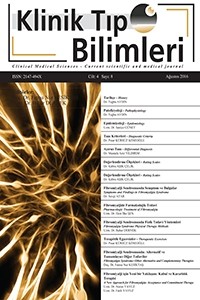Dirençli Hipertansiyon
ÖzDirençli hipertansiyon diüretik içeren en az 3 antihipertansif ilacın tam veya tolere edilebilen en yüksek dozuna rağmen kan basıncının en az 140/90mmHg olması olarak tarif edilir. Dirençli hipertansiyon hipertansif hastaların %9-18’inde gözüken ciddi bir tıbbi durumdur. Obezite, diabet ve kronik böbrek hastalığı gibi ko-morbid durumlarlasıklıkla ilişkilidir. Hipertansiyon ve özellikle dirençli hipertansiyon patogenezinde renin-anjiyotensin sistemi, böbrekler ve sempatik sinir sistemi gibi farklı mekanizmalar vardır. Dirençli hipertansiyon tedavisinde anjiyotensin-dönüştürücü enzim inhibitörleri, anjiyotensin II reseptör blokerleri, diüretikler, uzun-etkili kalsiyum kanal blokerlerive mineralokortikoid reseptör antagonistlerini içeren çoklu ilaç tedavisinin etkili olduğu gösterilmiştir. Bununla birlikte, renal denervasyon veya barorefleks aktivasyon tedavisi gibi yeni tedaviler kan basıncı düşürme süreçlerinde yeni bir yol yaratabilirler.
Anahtar Kelimeler:
dirençli hipertansiyon, renal denervasyon, barorefleks aktivasyon terapisi
Resistant Hypertension
AbstractResistant hypertension is defined by a blood pressure of at least 140/90 mmHg despite treatment with full doses or maximum tolerated doses of at least three antihypertensive medications, including a diuretic. Resistant hypertension is a severe medical condition which is estimated to appear in 9-18% of hypertensive patients. Resistant HTNis frequently associated with comorbidities such as obesity, diabetes, and chronic kid-ney disease. Different mechanisms are involved in the pathogenesis of hypertension and particularly in resistant hypertension: the reninangiotensin-aldosterone system, the kidneys, and the sympathetic nervous system. A multidrug therapy including angiotensin- converting enzyme inhibitors, angiotensin II receptor blockers, beta blockers, diuretics, long-acting calcium channel blockers and mineralocorticoid receptor antagonistshas been demonstrated to be effective in resistant hypertension treatment. Additionally, innovative therapies, e.g. a renal denervation or baroreflex activation therapy, may create a novel pathway of blood pressure lowering procedures.
___
- Kaynaklar 1-Braam B, Taler SJ, Rahman M, Fillaus JA, Greco BA, Forman JP,Reisin E, Cohen DL, Saklayen MG, Hedayati SS. Recognition andManagement of Resistant Hypertension. Clin J Am Soc Nephrol. 2017Mar 7;12(3):524-535. 2-Mancia G, Fagard R, Narkiewicz K, Redon J, Zanchetti A, Böhm M,et al. 2013 ESH/ESC guidelines for the management of arterial hyper-tension: the Task Force for the Management of Arterial Hyperten-sion of the European Society of Hypertension (ESH) and of the Eu-ropean Society of Cardiology (ESC). Eur Heart J. 2013Jul;34(28):2159-219. 3-Weber MA, Schiffrin EL, White WB, Mann S, Lindholm LH, Kener-son JG, et al. Clinical practice guidelines for the management of hyper-tension in the community a statement by the American Society ofHypertension and the International Society of Hypertension. JHypertens. 2014 Jan;32(1):3-15. 4-Krause T, Lovibond K, Caulfield M, et al: Management of hyperten-sion:summary of NICE guidance. BMJ 2011; 343:d4891. 5-Williams B, MacDonald TM, Morant S, Webb DJ, Sever P, McIn-nes G, et al; British Hypertension Society's PATHWAY Studies Gro-up.. Spironolactone versus placebo, bisoprolol, and doxazosin to de-termine the optimal treatment for drug-resistant hypertension(PATHWAY-2): a randomised, double-blind, crossover trial. Lan-cet. 2015 Nov 21;386(10008):2059-68. 6-Krum H, Schlaich M, Whitbourn R, Sobotka PA, Sadowski J, Bar-tus K, et al. Catheter-based renal sympathetic denervation for resis-tant hypertension: a multicentre safety and proof-of-principle cohortstudy. Lancet 2009; 373: 1275-81 7-Esler MD, Krum H, Sobotka PA, Schlaich MP, Schmieder RE, BohmM. Renal sympathetic denervation in patients with treatment-resis-tant hypertension (the symplicity HTN-2 trial): A randomised con-trolled trial. Lancet 2010; 376: 1903-9. 8-Krum H, Barman N, Schlaich M, Sobotka P, Esler M, Mahfoud F,et al. Catheterbased renal sympathetic denervation for resistant hyper-tension: durability of blood pressure reduction out to 24 months.Hypertension 2011; 57: 911-7. 9-Bhatt DL, Kandzari DE, O'Neill WW, D'Agostino R, Flack JM, Kat-zen BT, Leon MB, Liu M, Mauri L, Negoita M, Cohen SA, Oparil S,Rocha-Singh K, Townsend RR, Bakris GL; SYMPLICITY HTN-3 In-vestigators. A controlled trial of renal denervation for resistant hyper-tension. N Engl J Med. 2014 Apr 10;370(15):1393-401. 10-ASTRAL Investigators., Wheatley K, Ives N, Gray R, Kalra PA, MossJG, Baigent C, Carr S, Chalmers N, Eadington D, Hamilton G, Lip-kin G, Nicholson A, Scoble J. Revascularization versus medical the-rapy for renal-artery stenosis. N Engl J Med.2009 Nov12;361(20):1953-62. 11-Cooper CJ, Murphy TP, Cutlip DE, Jamerson K, Henrich W, ReidDM, Cohen DJ, Matsumoto AH, Steffes M, Jaff MR, Prince MR, Le-wis EF, Tuttle KR, Shapiro JI,Rundback JH, Massaro JM, D'Agos-tino RB Sr, Dworkin LD; CORAL Investigators.Stenting and medi-cal therapy for atherosclerotic renal-artery stenosis. N Engl J Med.2014 Jan 2;370(1):13-22. 12-Scheffers IJ, Kroon AA, Schmidli J, Jordan J, Tordoir JJ, Mohaupt MG,Luft FC, Haller H, Menne J, Engeli S, Ceral J, Eckert S, Erglis A, Nar-kiewicz K, Philipp T, de Leeuw PW. Novel baroreflex activation the-rapy in resistant hypertension: results of a European multi-center fea-sibility study. J Am Coll Cardiol. 2010 Oct 5;56(15):1254-8. 13-Bisognano JD, Bakris G, Nadim MK, Sanchez L, Kroon AA, Scha-fer J, de Leeuw PW,Sica DA. Baroreflex activation therapy lowersblood pressure in patients with resistant hypertension: results fromthe double-blind, randomized, placebo-controlled rheos pivotal tri-al. J Am Coll Cardiol. 2011 Aug 9;58(7):765-73. 14-Wallbach M, Lehnig LY, Schroer C, Lüders S, Böhning E, Müller GA,Wachter R,Koziolek MJ. Effects of Baroreflex Activation Therapy onAmbulatory Blood Pressure in Patients With Resistant Hypertensi-on. Hypertension. 2016 Apr;67(4):701-9. 15-Lobo MD, Sobotka PA, Stanton A, Cockcroft JR, Sulke N, Dolan E,van der Giet M, Hoyer J, Furniss SS, Foran JP, Witkowski A, Janus-zewicz A, Schoors D, Tsioufis K, Rensing BJ, Scott B, Ng GA, Ott C,Schmieder RE; ROX CONTROL HTN Investigators.. Central arte-riovenous anastomosis for the treatment of patients with uncontrol-led hypertension (the ROX CONTROL HTN study): a randomised con-trolled trial. Lancet. 2015 Apr 25;385(9978):1634-41. 16-Ott C, Lobo MD, Sobotka PA, Mahfoud F, Stanton A, Cockcroft J,Sulke N, Dolan E, van der Giet M, Hoyer J, Furniss SS, Foran JP,Witkowski A, Januszewicz A,Schoors D, Tsioufis K, Rensing BJ, Sa-xena M, Scott B, Ng GA, Achenbach S, Schmieder RE. Effect of Ar-teriovenous Anastomosis on Blood Pressure Reduction in PatientsWith Isolated Systolic Hypertension Compared With Combined Hyper-tension. J Am Heart Assoc. 2016 Dec 21;5(12).
- ISSN: 2147-494X
- Başlangıç: 2013
- Yayıncı: Selen Medya Yayıncılık Tanıtım ve Organizasyon Hizmetleri
